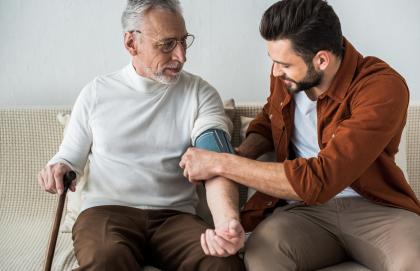Recognizing a medical emergency is the first step towards getting appropriate treatment. For everyday injuries and illnesses, our urgent primary care visits may be a better choice for your needs. If you, or someone else, develops any of the following signs or symptoms, seek emergency care immediately.
If you are experiencing any of the following symptoms, don't wait! Call 911 or have someone bring you to the Emergency Department. If you call 911, emergency medicine professionals can give you pre-hospital treatment immediately. This may save your life.
Emergencies
The life-threatening and urgent medical problems we treat in the Emergency Department include:
- Abuse: domestic, child, elder, sexual assault
- Acute and unexplained change in behavior, such as when a previously normal person becomes agitated, confused, or withdrawn
- Breathing difficulties—someone feels as if they cannot breathe
- Chest pain
- Coughing or vomiting blood
- Deep cuts or bleeding that won’t stop
- Electrical shocks
- Numbness in the face, arm, or leg
- Poisonings or overdoses
- Seizures
- Severe fractures
- Severe burns
- Severe abdominal pain
- Severe or worsening reaction to an insect bite or drug or other allergens, especially if there is difficulty breathing
- Shock—rapid, shallow breathing; cold, clammy skin; rapid, weak pulse; dizziness, fainting, or weakness
- Spinal injuries
- Sudden, acute onset of pain of any kind
- Sudden, severe headache (not a migraine)
- Sudden blurred vision or loss of vision
- Sudden dizziness, weakness, or loss of coordination or balance
- Sudden onset of weakness or inability to move a part of the body
- Unconsciousness—you cannot wake someone
- Any other condition you believe is life-threatening
These are only a few of the symptoms that could indicate that emergency medical attention is needed. If there is any doubt as to the seriousness of the illness or injury, seek medical attention at once.
Calling 911 for prehospital care & transportation
When you call, be prepared to give the following information:
- Your name
- The telephone number from where you are calling
- The address and any landmarks to assist the ambulance in locating you
- A description of the victim's condition as best you can
DO NOT HANG UP! Let the emergency personnel end the conversation. They may have additional questions that are important to help you.
After the call, be sure to unlock your door and turn on any outside lights if appropriate. Try to have a neighbor, friend, or relative stationed in front of your house or location to help direct ambulance personnel to the victim.
Learn what to expect once you arrive at the Emergency Department.
Urgent Primary Care Visits for treatment of everyday illnesses and minor injuries.
Feeling under the weather? Suffering from a simple broken bone or muscle strain? Do you need stitches for a cut? Just give us a call, then come on down—our Urgent Visits team can help! Learn about urgent primary care visits.

